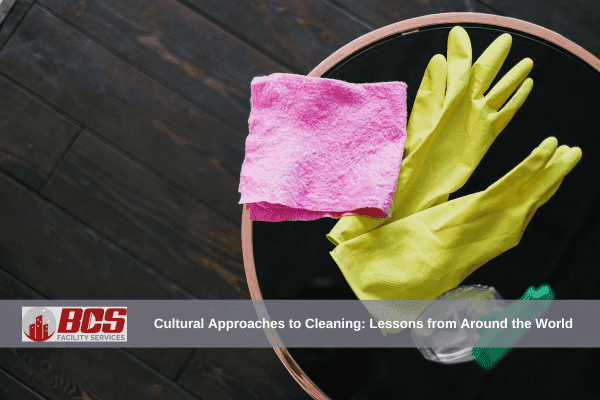
Cultural Approaches to Cleaning: Lessons from Around the World
Have you ever stopped to think about how the way we approach workplace cleaning can reflect our cultural values? Across the globe, different cultures have developed unique practices and beliefs about cleanliness, offering fascinating insights into what matters most to them. By exploring these diverse methods, we can learn valuable lessons that businesses can apply in their own workplaces.

Table of Contents
- 1 Japan: The Precision of ‘Seiso’
- 2 Scandinavia: Minimalistic Approach to Cleanliness
- 3 India: Ritualistic and Thorough
- 4 Middle East: Hospitality and Its Emphasis on Cleanliness
- 5 Southeast Asia: Harmony with Nature in Cleaning
- 6 Africa: A Collective Responsibility
- 7 Integrating Global Cleaning Insights in Modern Workplaces
- 8 Understanding and Integrating Cultural Practices
Japan: The Precision of ‘Seiso’
In Japan, the emphasis on precision and order is reflected in their cleaning practices, particularly the ‘Seiso’ principle. This philosophy goes beyond mere tidiness to embody a deeper philosophy of respect, mindfulness, and care. By encouraging employees to take ownership of their workspace cleanliness and organize their areas, businesses can adopt this philosophy and promote efficiency and respect for the workplace.
In Scandinavia, the minimalist approach to cleanliness is influenced by the culture’s long-standing embrace of minimalism. This ethos is about creating spaces that are functional, simple, and conducive to well-being. Companies can incorporate Scandinavian minimalism by reducing clutter in the office, opting for functional furniture and decor, and promoting a clean and streamlined work environment.
India: Ritualistic and Thorough
In India, cleaning has a ritualistic element, particularly evident during festivals. This involves a comprehensive cleaning that goes beyond the surface, symbolizing a fresh start and the welcoming of positive energy. By scheduling regular deep cleaning sessions, businesses can take inspiration from this and rejuvenate the workspace, boosting morale.
Middle East: Hospitality and Its Emphasis on Cleanliness
In the Middle East, cleanliness is directly linked to hospitality and respect. A clean environment is a fundamental aspect of welcoming guests, reflecting the importance of making visitors feel valued and comfortable. In a business context, this means maintaining pristine common areas like lobbies and meeting rooms, ensuring that these spaces are always ready to make a positive impression on visitors and staff alike.
Southeast Asia: Harmony with Nature in Cleaning
In Southeast Asia, cleaning practices are rooted in a harmonious relationship with nature. The use of natural, eco-friendly cleaning solutions emphasizes health and sustainability, utilizing ingredients readily available in the environment. By using natural cleaning products and reducing the use of harsh chemicals, businesses can adopt this eco-friendly approach and enhance the workplace environment for employees’ health.
Africa: A Collective Responsibility
Lastly, in many African cultures, cleaning is a collective effort, reflecting the community’s unity and shared responsibility. This communal approach fosters a sense of belonging and mutual accountability, with everyone contributing to maintaining a clean environment. Businesses can mirror this in initiatives that encourage team-based cleaning efforts or clean-up drives, promoting a sense of unity and collective responsibility among employees.
Integrating Global Cleaning Insights in Modern Workplaces
Blending Tradition with Modern Efficiency
In the contemporary business landscape, integrating global cleaning insights isn’t just about adopting new methods; it’s about blending time-honored traditions with modern efficiency. This integration can lead to workplaces that are not only cleaner but also culturally aware and environmentally conscious.
Adapting Global Practices for Diverse Work Environments
To adapt global cleaning practices to diverse work environments, businesses can take inspiration from the following examples:
- From Japan’s ‘Seiso’: Businesses can learn the importance of regular, disciplined cleaning and organization. This can improve operational efficiency and create a respectful workplace culture.
- Scandinavian Minimalism: Embracing this approach could help businesses create more manageable and stress-free cleaning routines. A decluttered and functional workspace facilitates easier maintenance and a pleasant working environment.
- India’s Deep-Cleaning Rituals: These can inspire businesses to undertake periodic thorough cleanings, which can rejuvenate the workspace and boost employee morale.
- Middle Eastern Focus on Hospitality: This teaches the value of maintaining pristine communal spaces, reflecting a company’s commitment to creating a welcoming environment for all.
- Southeast Asia’s Eco-Friendly Methods: Incorporating these practices shows a commitment to sustainability, enhancing the health of the workplace environment.
- African Communal Approach: Adopting this can encourage team collaboration, making cleaning a shared responsibility that fosters community within the workplace.
Understanding and Integrating Cultural Practices
In conclusion, embracing diverse cultural approaches to cleanliness can provide valuable insights into how our environments and ways of life influence our cleaning practices. By integrating global cleaning insights into modern workplaces, businesses can create cleaner, more efficient, and culturally aware spaces. Adopting time-honored traditions and blending them with modern efficiency can lead to work environments that foster respect, unity, and well-being.
Embracing global cleaning insights can elevate your workspace, but achieving perfection often requires a professional touch. At Burgos Cleaning, we blend these diverse cultural practices with our expert cleaning services to create a workspace that’s not just clean, but a testament to global harmony and efficiency. Let us help you make your office a shining example of cleanliness and cultural respect.